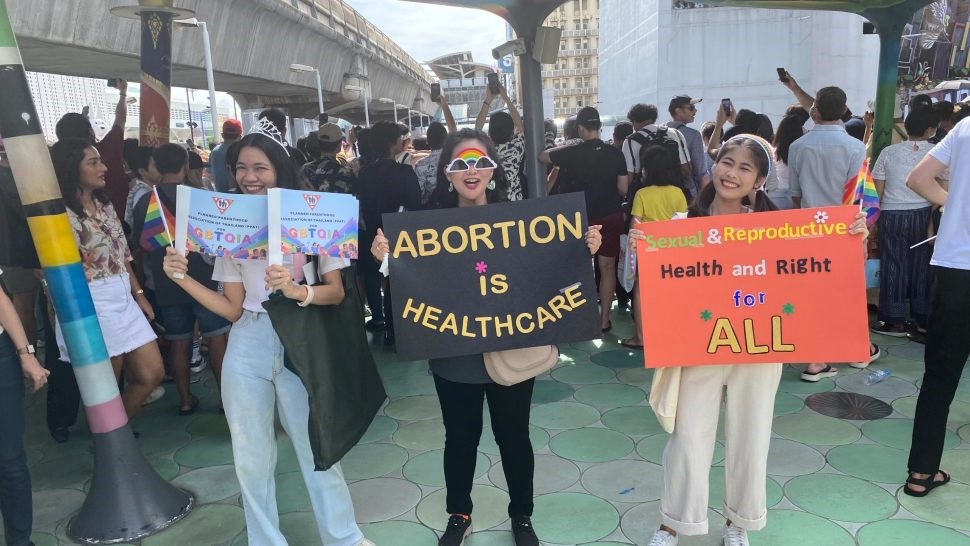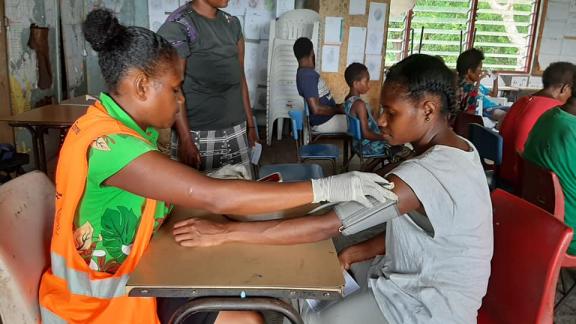Across the globe, millions seeking abortion services are still denied essential healthcare and the fundamental right to make autonomous decisions about their bodies and lives. The US Supreme Court’s decision two years ago to overturn Roe v. Wade, which had provided federal protection for abortion services, has had far-reaching consequences, invigorating anti-rights movements worldwide and influencing debates, policies, funding, and services related to reproductive rights.
Closer to home, access to safe abortion services has always been a significant challenge. The stigma surrounding abortion, combined with stringent legal restrictions and limited service availability, creates a complex and often prohibitive backdrop.
The repeal of Roe v. Wade has galvanised social movements across the region. Despite significant opposition, these movements are building on decades of grassroots activism. In 2024, a year dominated by elections, abortion rights have become a critical issue on the ballot. Activists are pushing for progress, emphasising that safe abortion access remains a crucial issue that needs urgent attention and action.

Legislative Progress and Persistent Barriers
In Japan, the approval of the MeFeego Pack, a two-step abortion pill, in April 2023 marked significant progress decades after similar medications became widely available elsewhere. However, access remains limited a year later, with only 3% of clinics offering this service. Financial burdens and spousal consent requirements continue to hinder women's autonomy. Public sentiment and years of advocacy continue to fuel campaigns and pressure lawmakers to reform existing policies.
The decriminalisation of abortion in South Korea in 2021 was a significant victory. Despite this milestone, accessing safe and reliable abortion care remains a challenge. Activists continue to advocate for regulations aligning with global human rights standards.
A 2023 report by the Network to Assure Rights for Safe Abortion to Everyone highlights difficulties in obtaining reliable information and finding medical institutions for safe abortions. Most medical institutions offer only surgical abortions or misoprostol alone instead of the more effective combination of mifepristone and misoprostol. In May, a South Korean court rejected an appeal by Women on Web (WoW) and Open Net Korea to unblock the WoW website, highlighting systemic gender discrimination impeding access to care.

Challenges in Access and Healthcare Provision
Thailand boasts some of the region's most progressive abortion laws. Following a legal challenge, the Constitutional Court in February 2020 declared the Criminal Code's abortion ban unconstitutional, leading to amendments in 2022 that permit abortion up to 20 weeks under specific circumstances.
However, health experts reveal that affordable abortion access remains out of reach for many women due to resistance from medical professionals. The AIDS Access Foundation reported that over 100 public and private hospitals have denied abortion requests and refused to refer women to other facilities. Earlier this year, local activists petitioned the public health committee to expand National Health Security Office (NHSO)--funded abortion services and ensure nationwide coverage.
“Ensuring equal access to abortion services for everyone, including migrant workers and refugees, is essential. Legal reforms and ongoing efforts must guarantee accurate information, counselling, financial aid, and transportation support for abortion care," said Dr Nanthakan S. Woodham, Executive Director of the Planned Parenthood Association of Thailand (PPAT).
Myanmar's internal conflict and humanitarian crisis have displaced over 1.9 million people, with about 91,000 living in nine camps along the Thailand-Myanmar border. The Planned Parenthood Association of Thailand provides critical sexual and reproductive health (SRH) services, reaching nearly 4,000 beneficiaries.
The World Health Organization's (WHO) updated Abortion Care Guideline highlights that 60% of unintended pregnancies and 30% of all pregnancies end in induced abortion, with nearly half of these procedures being unsafe. Unsafe abortions disproportionately affect vulnerable and marginalised groups, contributing to a significant portion of maternal deaths each year, accounting for 4.7% to 13.2% of annual maternal fatalities, translating to approximately 13,865 to 38,940 deaths.

Anti-Rights Debates and Policies
The framing of abortion influences public and political debates, policies, and advocacy strategies, contributing to its stigma. The Philippines enforces some of the world's strictest abortion laws, with no apparent exceptions, even in cases of rape, incest, or threats to the woman's life. According to the Philippine Safe Abortion Advocacy Network (PINSAN), 1.26 million abortions were conducted in 2020, jeopardising women's lives and health. This number is expected to rise. Additionally, a University of the Philippines study estimates that 1.1 million abortions occur annually.
Despite these alarming statistics, abortion remains illegal in the predominantly Catholic Philippines, with laws dating back over a century. Women who undergo abortions face prison terms of two to six years, while healthcare professionals assisting in these procedures also face severe penalties. Local church leaders and anti-rights groups have supported the Supreme Court's stance, mirroring the anti-abortion sentiments prevalent in the global anti-rights movement.
Abortion laws in most Pacific Island countries, such as the Solomon Islands, Fiji, Samoa, Cook Islands, and Tonga, are highly restrictive, significantly impacting the lives and health of women in the region. These legal constraints create substantial challenges for those seeking, providing, or assisting with abortions, resulting in potential penalties for abortion seekers, healthcare providers, advocates, and support individuals.
Institutional forces such as racism, sexism, colonialism, and poverty profoundly influence individual freedoms in these societies, exacerbating the difficulties faced by women and marginalised groups in accessing reproductive health services.
There is no comprehensive national data collected on abortion across the Pacific. According to the Guttmacher Institute, there are an estimated 34 abortions annually per 1,000 women of reproductive age, with one-third being unsafe. However, these numbers are likely underreported due to stigma and reluctance to disclose in legally restrictive settings. The intersection of these institutional barriers further complicates the landscape, highlighting the urgent need for legal reforms and the protection of reproductive rights in the Pacific region.

Regional Cooperation and Advocacy
The impact of the Roe v. Wade repeal has sparked a surge in regional cooperation to strengthen reproductive rights advocacy. Organisations are calling on governments to ensure safe abortion access, recognise the intersectionality of reproductive rights, and repeal discriminatory laws. Emphasis is being placed on evidence-based policies, privacy protections, non-discrimination in healthcare, and comprehensive sexuality education.
In February, the Asia Safe Abortion Partnership organised one of the largest post-Roe conferences in the region. The Abortion & Reproductive Justice Conference (ARJC), themed "The Unfinished Revolution," gathered over 340 delegates in Bangkok, Thailand, including activists, academicians, and youth leaders. The conference aimed to create the potential for cross-movement collaborations and synergies to strengthen safe abortion advocacy work with allied movements in social justice.
IPPF Member Associations highlighted critical topics in panel discussions, including ensuring safe abortion access for migrant workers in Thailand, the VCAT framework for service providers in Cambodia, upholding safe abortion rights amidst climate justice, and strategic approaches to abortion care in Hong Kong, and addressing barriers in the Solomon Islands.
“Abortion is legal in Cambodia, yet stigma limits access, with only 65% of health facilities offering safe abortion care. Cambodia must invest more financial resources to enhance service coverage and decentralise training from national to sub-national levels,” said Dr Chivorn Var, Executive Director of the Reproductive Health Association of Cambodia (RHAC).
In Hong Kong, where abortion policies are considered some of the most progressive in the region, access to abortion services still relies heavily on financial means. “Efforts to improve the quality of care ensure women have access to accurate information on abortion and contraception. This supports their autonomy and informed health decisions while addressing stigma and discrimination,” said Dr Mona Lam, Executive Director of the Family Planning Association of Hong Kong (FPAHK).
The ongoing struggles and efforts to secure reproductive rights highlight the critical need for legal reforms and increased access to safe and effective abortion services. As movements continue to push for change, it is essential to support these initiatives and address the systemic barriers that hinder women's health and rights.
For more information, contact:
Malarvili Meganathan,
Regional Communications, Voice & Media Advisor,
[email protected]
Read more from IPPF global aboutimpacts of the overturning of Roe v. Wade, 2 years on.
when









